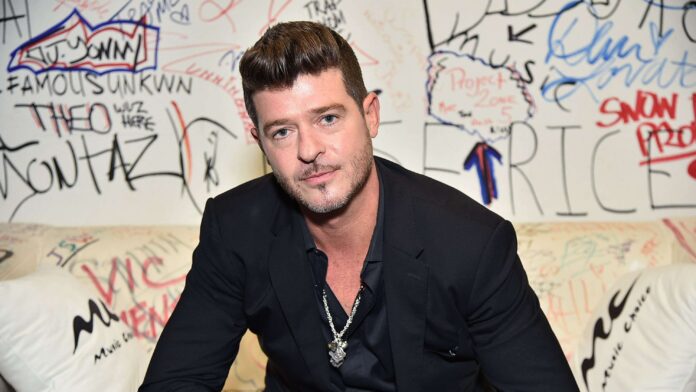
Essential Facts:
- Robin Thicke sued by BackGrid USA for posting unlicensed paparazzi photos.
- Lawsuit emphasizes Thicke’s extensive knowledge of copyright laws.
- Case highlights ongoing legal challenges faced by celebrities regarding image rights on social media.
By Samuel Lopez – USA Herald
LOS ANGELES, CA – Robin Thicke, renowned singer-songwriter and music producer, has become the latest celebrity embroiled in a copyright infringement battle. In a lawsuit filed on Monday, June 16, 2025, photo agency BackGrid USA accused Thicke of unlawfully posting paparazzi photographs of himself on his Instagram account.
BackGrid USA alleges that Thicke violated federal copyright laws by sharing two of their licensed photographs without permission or payment. The images in question depicted Thicke riding in a convertible and dining out at the upscale restaurant Catch Steak with his wife, April Love Geary. While these posts have since been deleted from Thicke’s social media profile, screenshots preserved in court documents confirm their previous presence online.
BackGrid’s attorneys contend that Thicke’s unauthorized use of the photographs significantly harmed their intellectual property rights. The lawsuit explicitly states, “Defendants violated federal law by willfully infringing BackGrid’s copyrights to at least two photographs. By uploading the Thicke photographs to the Instagram account, defendants encourage their fans to ‘share’ the photograph, thus causing others to also willfully infringe and multiplying the harm to BackGrid.”
The agency further highlights Thicke’s deep familiarity with copyright law, particularly due to his extensive experience as a musician and copyright holder himself. Thicke reportedly owns over 100 registered copyrights, suggesting he should have understood the necessity of obtaining proper licensing before sharing copyrighted materials.
Moreover, the legal action notes Thicke’s past involvement in copyright disputes, notably the highly publicized litigation surrounding his 2013 smash hit “Blurred Lines.” That case, which involved allegations of musical plagiarism, further underscores Thicke’s presumed expertise in intellectual property issues.
This latest suit against Thicke aligns with a broader trend of celebrities facing lawsuits over sharing paparazzi photos without proper licensing agreements. Prominent figures such as Jennifer Lopez, Miley Cyrus, Dua Lipa, and Justin Bieber have encountered similar litigation in recent years. In May 2025, Jennifer Lopez faced an analogous lawsuit from BackGrid USA regarding unauthorized posts from a Golden Globes pre-party.
Legal experts emphasize that U.S. copyright law typically favors photographers and content licensors, not the subjects of the photos. Despite common assumptions, public figures do not automatically have rights over images depicting them captured by photographers. Consequently, posting these images without appropriate licensing agreements constitutes copyright infringement.
The ramifications of this case extend beyond mere financial penalties. BackGrid’s lawsuit seeks not only monetary compensation but also a judicial injunction to prevent Thicke from future unauthorized usage. Given Thicke’s public stature and previous legal experience, a ruling against him could set significant legal precedents and reinforce the necessity for celebrities and influencers to secure explicit permission before sharing third-party images on their personal platforms.
This lawsuit serves as a stark reminder to public figures and social media influencers alike: the digital sharing of professional photographs—even images featuring oneself—requires adherence to strict copyright protocols.


